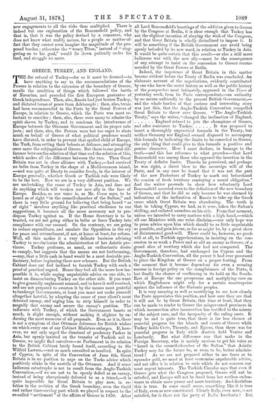TOPICS OF THE DAY.
MR. GLADSTONE ON ENGLAND'S WORK.
'VIM GLADSTONE has been represented as reiterating, in his new paper in the Nineteenth Century for September, little but the old indictment against the Ministry of which the English people,—and more particularly the Tory part of it,—were tired. That he does reiterate this indictment is matter of course. For what point, or effect would there be in an elaborate dissertation on the true aims and duties of England, if it bore no immediate relation to the mistakes and the glorifications of the hour But those who thrust aside so fretfully Mr. Gladstone's essay as a mere rehearsal of old charges in the old way, have either not read it, or not attended to anything in it at which they did not find it easy to sneer. The most important part of it is indeed a very thoughtful and very striking attempt either to refute the charge brought against the modern Liberalism, that it is disposed to ignore the true position of England in Europe, and to dwarf her activity to the scale of a timid and cowering imagination, or, on the other hand, to justify any reluctance to enter on new enterprises of gigantic scope which the modern Liberals openly avow. On the one hand, Mr. Gladstone absolutely denies that the Liberal party ever have wished to withdraw England from her legitimate position in relation to European politics,—that of an impartial and disinterested arbiter, too much isolated her- self to have vehement selfish interests in European quarrels, and yet too strong in her isolation to be a cypher, or anything like a cypher, in the European reckoning. On the other hand, he points out with great power how much we are endangering not only this influence of ours, but our efficiency for every other characteristic task, by so accumulating new and compli- cated obligations as to paralyse us in the discharge of those very heavy duties which we have already incurred.
Mr. Gladstone professes himself, in relation to the foreign policy of Great Britain, a disciple of the school of Canning. And he defines Canning's foreign policy as characterised chiefly by this belief,—that in relation to European politics, it is the first duty and the highest function of Great Britain to help on in other countries as well as in our own the cause of "rational freedom and self-government." This it was which made the foreign policy of Mr. Canning so odious in the sight of Tories, —because he thought more of giving whatever aid we could to Continental movements in the direction of freedom, than of "foisting into every question" pretended British interests, which would have destroyed alike our dignity and our influence. Now Mr. Gladstone maintains that from this leading principle of Mr. Canning's, the Liberal party of his time has never swerved. In 1859-60, as he points out, they used the foreign influence of England to great effect to support the redemption and union of Italy. In 1861, they peremptorily resisted the attempt of the American Government to take outS of the 'Trent' the Confederate emissaries to this country. In 1861, again, we compelled the Sultan "to cut off the head of his tyrannical Pasha, and to establish a government in the Lebanon not dependent for its vital breath on Constanti- nople." Again, in 1864 the Liberal Government invited France to concur in an ultimatum to the German Powers, and in an agreement to defend Denmark, though the Govern- ment of that day did not think it right to act alone in the same sense, when the co-operation of France was refused. Again, in 1870, when the Liberal Government gave Belgium a formal guarantee, and enlarged the Army, in order to increase their means of giving effect to that guarantee, they certainly asserted, as strongly as any Government could, the direct right of England to interfere on the side of one of the smaller Powers, whose independence had been threatened by one of the basest of intrigues. And as Mr. Gladstone justly says, the loyalty with which we carried out the ' Alabama ' arbitration, at the risk of submitting to a very unjust award, was really a vast step in the right direction, and did much both to conciliate the good-will of the United States, and to raise instead of lowering the foreign influence of England,— just because it showed the thorough disinterestedness of our action in relation to that arbitration. Mr. Gladstone denies, then, that the Liberals have ever supported a selfish insular policy. What they have supported is the unselfish Continental policy,—though not, perhaps, let us add, always with sufficient energy, for in the case of Denmark we certainly could and ought to haye done much more than we did. On the other hand, Mr. Gladstone urges, with very great force and with a very effective array of illustrations, the danger of crippling ourselves for the duties which we have already assumed, by being too ready and eager to burden ourselves with any amount of new responsibilities, no matter what the diffi- culty or cost of discharging them. What, he says, would new be the natural feeling of Belgium, if she had now any reason to fear such a scheme as the Benedetti scheme for assigning her to a new Power ? Would she be encouraged or depressed by the recollection that Russia had only to make a feint on some point some three or four thousand miles from England, to concentrate all our energies, and perhaps a good deal more energy than we have to concentrate, on an effort so far eastward, that we should have little strength or heart left for resisting a powerful neighbour's encroachment upon Belgium ? What would any of our many Colonies think—if they feared a descent upon one of them from a rapacious neighbour— of the advantage we had secured for ourselves in engaging to hold Turkey scatheless against a Russian invasion ? And Mr. Gladstone asks how this new policy of multiplying recklessly foreign obligations will affect the only justification of our Indian Empire,—namely, our sincere resolve to rule the people justly. If we are to meet Russia at any moment she may choose in Asia Minor or Mesopotamia, will not the whole basis of our Indian policy be in danger of gradual transforma- tion from a policy which consults first the welfare of the people, into a policy which provides first the means for great military display against Russia And lastly, Mr. Gladstone explains what he means by speaking of the British Govern- ment as already overweighted by the number and com- plexity of its obligations. He does not mean, apparently, that there might not be enough Englishmen found for the work of proconsular government, wherever it might chance that our destiny called us,—but that the central supervision of the Legislature and the Administration over such distant subordinates, long ago inefficient, is becoming daily more and more dangerously superficial. "A protracted experience of public affairs not unattended with a high estimate of the general diligence, devotion, and ability of the Parliamentary as well as the Civil servants of the Crown, has long convinced me that of the more difficult descriptions of the public business it is only a small part that is transacted with the requi- site knowledge, care, and thoroughness. We have undertaken in the matter of government far more than ever in the history of the world has been previously attempted by the children of men. None of the great continuous Empires of ancient or modern times ever grappled with such a task. The difference of discontinuity, even if it stood alone, is an essential difference. The nearest approach to our case was, perhaps, that of the ' Macedonian conqueror, to whose organising power posterity has not always done justice. But he did not rule the vast countries under his sway from Pella, as we do from London. He accepted the change in the centre of gravity, and became, as he could not but become, an Asiatic sovereign,-- a transforma- tion for which it may be presumed that the line of British monarchs is not by any means prepared." And Mr. Gladstone goes on to point out that the tendency of the times is to increase instead of diminishing the cares and labours of Government. This is why he thinks that it would be better "to consolidate a still undeveloped Empire, which might well satisfy every ambition, as it assuredly taxes to the utmost every faculty, than to excite the enmity or suspi- cion of the world by the greed of an endless aggrandise- ment."
In most of this we heartily agree, though we do not think that we should always concur with Mr. Gladstone in his appli- cation of the principles he lays down. He makes too much fuss, we think, about Cyprus, where our error lay rather in the mode of acquisition,--in the promises which were the equivalents we gave for it,—than in the acquisition itself, which will add very little to our burdens, and something tangible probably to the well-being of the inhabitants. In the same way, we should never shrink from doing all that may be in our power,—and much may yet be in our power,—for the good government of Egypt, even though this should entail our pro- viding Egypt, too, with an administration. There are additions to responsibility which imply a much more than equivalent contraction of our risks, and therefore of the wear-and-tear of our administrative energies ; and to provide for the security of Egypt, would be one such addition. But the engagement to defend Asiatic Turkey is not such an addition. It multiplies frightfully almost every other risk we previously had, does not diminish one of them, and adds the enormous burden of the view engagements to all the risks thus multiplied. There is indeed but one explanation of the Beaconsfield policy, and that is, that it VMS the policy devised by a romancer, who does not know what reality means, for a people so naatter-of- fact that they cannot even imagine the magnitude of the pro- posed burden ; otherwise the "weary Titan," instead of "stag- gering on to his goal," would lie down patiently under his load, and struggle no more.































 Previous page
Previous page